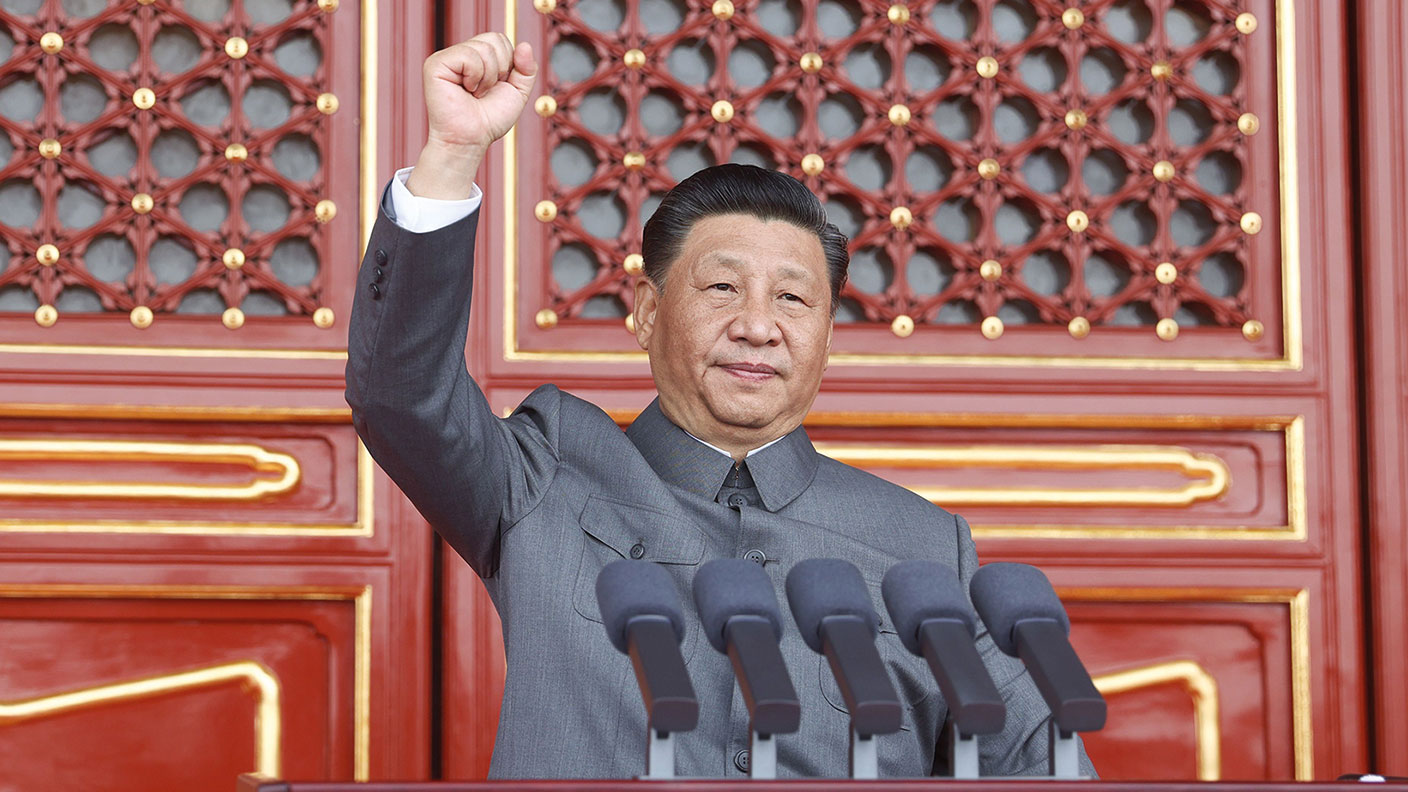China: rule by law, not rule of law
Beijing’s sudden attack on the online-education sector is a wake-up call for global investors, says Edward Chancellor


Get the latest financial news, insights and expert analysis from our award-winning MoneyWeek team, to help you understand what really matters when it comes to your finances.
You are now subscribed
Your newsletter sign-up was successful
Want to add more newsletters?

Twice daily
MoneyWeek
Get the latest financial news, insights and expert analysis from our award-winning MoneyWeek team, to help you understand what really matters when it comes to your finances.

Four times a week
Look After My Bills
Sign up to our free money-saving newsletter, filled with the latest news and expert advice to help you find the best tips and deals for managing your bills. Start saving today!
Investors received a rude shock last month when Beijing abruptly changed the rules for US-listed Chinese education companies. With one stroke, shares in TAL Education and New Oriental Education and Technology became almost worthless. The Nasdaq Golden Dragon index of Chinese stocks listed in New York fell to half its peak. Investors suddenly realised their legal claims on these foreign listings were extraordinarily weak. Foreign investments on the mainland may not be much safer.
Chinese companies listed in the US used a complex offshore structure known as a variable interest entity (VIE), which allowed them to evade restrictions on foreign ownership of Chinese media and technology groups. VIEs were always a questionable arrangement, neither condoned nor explicitly repudiated by Beijing. Western investors received dividends from the mainland company, but had no legal claim on its assets. This crucial information was in the listing documents. Most investors apparently didn’t read them.
As with the VIEs, Western investors in China pay too little attention to “jurisdictional risk”, says Stewart Paterson of investment-research group Capital Dialectics. While investments in the West are protected by the rule of law, China’s markets are characterised by the “rule by law”: Beijing has the final say on how capital is allocated and who gets paid and who doesn’t. Many companies in China answer to internal party committees that can put the interests of government patrons above those of shareholders. No wonder Chinese equity returns have lagged. In the past five years, the S&P 500 index has gained twice as much as China’s benchmark CSI300.
MoneyWeek
Subscribe to MoneyWeek today and get your first six magazine issues absolutely FREE

Sign up to Money Morning
Don't miss the latest investment and personal finances news, market analysis, plus money-saving tips with our free twice-daily newsletter
Don't miss the latest investment and personal finances news, market analysis, plus money-saving tips with our free twice-daily newsletter
Red capitalism
Overweening business leaders risk more than just their fortunes. The former chairman of high-flying insurer Tomorrow Holdings disappeared from a Hong Kong hotel in 2017. Agents reportedly dragged him out of the Four Seasons in a wheelchair with a bag over his head. The state has since restructured his company. Last year, Alibaba’s Jack Ma fell from grace and the flotation of Ant Financial was pulled. Ma had accused China’s state-controlled banks of harbouring a “pawnshop mentality”. Property companies who cross Beijing’s “red lines”, capping the use of leverage, are next in line, says Paterson.
Western investors in China’s bond markets face different problems. “Red capitalism” resembles a shell game in which debts are shuffled around the financial system with little regard for legal niceties. For instance, when a wealth-management product issued by a Shanghai branch of Beijing-based Huaxia Bank defaulted in 2012, the losses were picked up by an apparently unrelated credit-guarantee firm. Non-performing loans are often moved from local-government funding vehicles to state-owned banks, and from banks to asset managers. Where losses finally end up is a political decision. The question of which Chinese debts are covered by sovereign guarantee remains murky. This concern is not merely academic. China is in the throes of one of history’s greatest credit booms. Since 2008, the ratio of non-financial debt to GDP has more than doubled to 289%. Several state-owned firms have defaulted on their debts. The national debt, worth 67% of GDP, seems manageable, but when contingent liabilities are included the true figure is probably much higher.
Despite its tough treatment of shareholders in foreign-listed companies, Beijing is still keen to attract foreign portfolio inflows. The mainland stockmarkets opened to Western investors in 2014 and the bond markets in 2017. In 2020 the stock of foreign onshore portfolio investment in China reached over five trillion yuan, up by 400% since 2014. So far this year, foreign purchases of Chinese onshore stocks and government bonds were up 50% compared with 2019, says the Peterson Institute for International Economics.
Westerners are attracted by the size and liquidity of China’s financial markets. The stockmarket offers diversification. Chinese government bonds yield more than their US counterparts. In recent years, index providers have raised both equity and bond-index weightings for China. Asset managers who shun China risk underperforming their benchmarks. Their greatest risk, however, is that they end up as collateral damage in a New Cold War, says Paterson.
Globalisation is slowly going into reverse. Western portfolio investments in China could provide President Xi Jinping with a potential bargaining chip if international relations with the United States and its allies continue to deteriorate. Furthermore, if China’s financial system eventually collapses under the weight of excessive debts, Beijing will have to consider which debts to honour and which to repudiate. The interests of international creditors won’t be a high priority.
When China’s communists took power in 1949 one of their first acts was to repudiate foreign obligations. Fifty years later, a large state-owned investment company, known as Guangdong International Trust and Investment Corp (Gitic), defaulted on its foreign bonds. Investors had assumed that Gitic’s liabilities carried the implicit backing of the state. Nope. Chinese ten-year government bonds currently yield 2% more than US Treasuries. Whether this premium adequately compensates foreign investors for the risk of non-repayment is questionable.
A longer version of this article was first published on breakingviews.com.
Get the latest financial news, insights and expert analysis from our award-winning MoneyWeek team, to help you understand what really matters when it comes to your finances.
Edward specialises in business and finance and he regularly contributes to the MoneyWeek regarding the global economy during the pre, during and post-pandemic, plus he reports on the global stock market on occasion.
Edward has written for many reputable publications such as The New York Times, Financial Times, The Wall Street Journal, Yahoo, The Spectator and he is currently a columnist for Reuters Breakingviews. He is also a financial historian and investment strategist with a first-class honours degree from Trinity College, Cambridge.
Edward received a George Polk Award in 2008 for financial reporting for his article “Ponzi Nation” in Institutional Investor magazine. He is also a book writer, his latest book being The Price of Time, which was longlisted for the FT 2022 Business Book of the Year.
-
 Should you buy an active ETF?
Should you buy an active ETF?ETFs are often mischaracterised as passive products, but they can be a convenient way to add active management to your portfolio
-
 Power up your pension before 5 April – easy ways to save before the tax year end
Power up your pension before 5 April – easy ways to save before the tax year endWith the end of the tax year looming, pension savers currently have a window to review and maximise what’s going into their retirement funds – we look at how
-
 Three key winners from the AI boom and beyond
Three key winners from the AI boom and beyondJames Harries of the Trojan Global Income Fund picks three promising stocks that transcend the hype of the AI boom
-
 RTX Corporation is a strong player in a growth market
RTX Corporation is a strong player in a growth marketRTX Corporation’s order backlog means investors can look forward to years of rising profits
-
 Profit from MSCI – the backbone of finance
Profit from MSCI – the backbone of financeAs an index provider, MSCI is a key part of the global financial system. Its shares look cheap
-
 'AI is the real deal – it will change our world in more ways than we can imagine'
'AI is the real deal – it will change our world in more ways than we can imagine'Interview Rob Arnott of Research Affiliates talks to Andrew Van Sickle about the AI bubble, the impact of tariffs on inflation and the outlook for gold and China
-
 Should investors join the rush for venture-capital trusts?
Should investors join the rush for venture-capital trusts?Opinion Investors hoping to buy into venture-capital trusts before the end of the tax year may need to move quickly, says David Prosser
-
 Food and drinks giants seek an image makeover – here's what they're doing
Food and drinks giants seek an image makeover – here's what they're doingThe global food and drink industry is having to change pace to retain its famous appeal for defensive investors. Who will be the winners?
-
 Barings Emerging Europe trust bounces back from Russia woes
Barings Emerging Europe trust bounces back from Russia woesBarings Emerging Europe trust has added the Middle East and Africa to its mandate, delivering a strong recovery, says Max King
-
 How a dovish Federal Reserve could affect you
How a dovish Federal Reserve could affect youTrump’s pick for the US Federal Reserve is not so much of a yes-man as his rival, but interest rates will still come down quickly, says Cris Sholto Heaton
